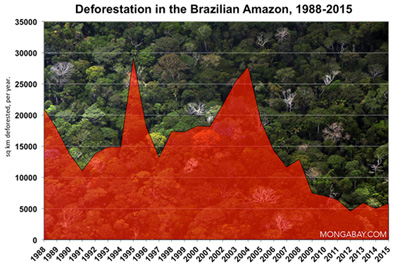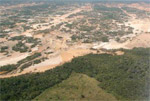Below is a quick review of some of the biggest environmental stories of 2010.
Climate change rears it ugly head (Hance)
A streak of freak floods in the US, a deadly heat-wave across Central Russia, record drought in the Amazon, deadly floods in Colombia and Venezuela, record highs all over the globe, and a catastrophic flood in Pakistan that affected 20 million people: this is the year when the impacts of climate change no longer appeared hazily in an abstract future, but seemed to be knocking on our collective doorstep.
While scientists have long stated that it is difficult to connect a single weather event—such as a single flood or drought—directly to climate change, the patterns of more frequent and severe weather worldwide is directly in line with climate change expectations. As natural disasters unfolded this year, both scientists and government officials came forward to state that such events were almost certainly worsened by a warming world.
Who knows what next year will bring?
Oil spill in the Gulf (Hance)

|
On April 20th, BP’s Deepwater Horizon oil rig exploded sending 4.9 million barrels of oil into the Gulf of Mexico over three months. The resulting ecological and economic disaster, mostly affecting Louisiana’s working class, will probably never be known. However, thousands of dead marine animals were pulled from the oil-stained waters and evidence has been found of oil killing coral reefs and coating parts of the deep sea floor. It will take years, if not decades, for the region to recover to its less-than-pristine pre-spill state.
Yet, perhaps that biggest and least reported part of this story is the lack of political change in the aftermath. Multinational big oil corporations continue to drill off-shore, many in deep water (water deeper than the Horizon), and some now are pushing to drill in the melting Arctic; Americans continue to consume oil like there’s no tomorrow (and no future generations) while electing a large array of pro-fossil fuel, climate-change deniers in the House and Senate; and the Obama Administration has backpedaled on tackling America’s dependency on oil like so many administrations before it.
In other words: America experienced its worst environmental disaster in its history, and no one learned a thing.
Agreement to save global biodiversity (Hance)
A landmark agreement was reached in Nagoya, Japan by 193 nations in the Convention on Biological Diversity (CBD) to save the world’s species. Conservationists largely stated that the agreement was noteworthy and a sizable step forward with 20 measurable goals, such as restoring 15 percent of degraded lands and protecting 10 percent of marine waters by 2020.
However, only time will tell if the agreement will be effective. It is a voluntary pact with no penalty for non-compliance or simply ignoring it. In fact, an earlier CBD agreement reached in 2002 promised to stem the loss in biodiversity worldwide by 2010. By all accounts that goal was widely missed. On the positive side, many participants at the meeting said there was a greater understanding of the connection of biodiversity to human well-being, as well as the recognition of looming mass extinction if business continues as usual.
Illegal logging crisis in Madagascar (Butler)
Illegal logging continued to plague Madagascar’s rainforest parks including Masoala and Makira. A survey in October found more than 10,000 people living within Masoala, the island’s most biodiverse reserve. Meanwhile NASA satellite data in December showed an uptick in forest fires in the region where most of the logging is occurring.
But there were signs that pressure from the outside world and Malagasy fed up with corruption and destruction of their natural resources started to have an impact. In March, the transition government, which seized power during a military coup last year, passed a decree banning logging and trade in rainforest hardwoods, including rosewood, following widespread international condemnation of timber trafficking. Evidence linking Andry Rajoelina to the rosewood trade kicked off a national “rosewoodgate” scandal, which at times pit the “interim authority” against local officials and civil servants in the water and forests department. The conflict continues to this day, but log exports from Madagascar remain greatly reduced relative to this time last year.
REDD kicks off in Indonesia (Butler)
Indonesia and Norway signed a billion dollar agreement to protect forests in the Southeast Asian nation, which has become the world’s third largest greenhouse gas emitter due to deforestation and peatlands degradation. Under the agreement, Indonesia will establish a two-year moratorium on new forestry concessions in primary forest areas and peatlands beginning in January 2011. The agreement also provides for a monitoring, reporting, and verification system as well as a degraded lands database, which will help Indonesian officials get a better sense of what land, outside forest areas, is available for development. The payments are performance-based but Norway will receive no carbon offsets from the program.
Critics fear the partnership may by stymied by corruption in the forestry sector and political pressure from the forest development lobby, primarily loggers, pulp and paper producers, and palm oil companies.
Brazil deforestation falls to its lowest level (Butler)
Deforestation in the Brazilian Amazon fell to the lowest rate on record, putting Brazil well on track to meet its targets for reducing rainforest destruction.
Analysis of satellite imagery by Brazil’s National Institute for Space Research (INPE) shows that 6,450 square kilometers of rainforest were cleared in the Amazon in the 12 months ended July 31, 2010, a 14 percent drop from the year earlier period. Brazil’s declining deforestation rate was attributed in several studies to a drop in global emissions from tropical deforestation since 2005. Deforestation is now estimated to account for around 10 percent of carbon dioxide emissions, down from 15-18 percent a decade ago.
 |
But while the results in Brazil were encouraging, there were already signs that 2011 might not be as rosy. Analysis released by Imazon, an NGO, revealed a sharp increase in “degradation”, which is often a precursor to deforestation. Sharply higher commodity prices, combined with resumption of agricultural lending and recovery of the Amazon cattle herd, will challenge efforts to reduce deforestation next year.
The Brazilian Amazon also showed the effects of climate change. 2010 saw the worst drought on record, which helped spur a large increase in wildfires and a spike in forest degradation in recent months. Climate modelers say drought in the southern Amazon is likely to worsen as sea surface temperatures in the tropical Atlantic rise. Perversely, the western and northern parts of the Amazon may see an increase in rainfall due to climate shifts.
Hungary’s red sludge (Hance)
It sounds like a monster from a badly-written horror movie of the 1950s, but indeed a million cubic meters of red sludge devastated two Hungarian villages, killing nine, and chemically burning a hundred or so others. Photos from the blood-red horror circled the world as if it were, in fact, a toxic monster from the deep. However, the red sludge was actually waste products from an aluminum processor. The waste poured into villages after a dam, containing it in a reservoir, broke open.
While the sludge eventually reached the Danube, scientists believed that its levels of heavy metals were not high enough to cause long term damage. However, the red muck did extinguish freshwater life in a number of local rivers.
Disasters such as this are not the only impacts of aluminum mining. More prosaic impacts include deforestation, water and energy use, and less dramatic, but still dangerous, pollution. One of the world’s most popular metals, aluminum is 100% recyclable, unlike many materials, without any loss in its physical properties.
Nestle caves to social media activists (Hance)
This David-vs.-Goliath story shows how social media sites such as Facebook and Twitter may be the new face of aggregated activism. The tale begins with Greenpeace posting a clever ad linking food-giant Nestle to destruction of rainforests in Southeast Asia through its palm oil. That may not have amounted to much until Nestle decided to ban the video from YouTube, citing copyright infringement. This sparked on-line outrage that was inflamed when a moderator on Nestle’s Facebook page was perceived as being snide with protesters. Months later, the food giant caved to demands, putting forward a detailed plan to rid all of its products—not just those containing palm oil—from any ‘deforestation footprint’.
The success of Greenpeace’s campaign, which really became online grassroots, proves just how potent (and powerful) social media sites have become in pressuring big business to change—quickly.
But the story does not end there. Sinar Mas Group, the conglomerate that controls the palm oil company that lost Nestle, responded with an aggressive campaign of its own, targeting Greenpeace and other environmental groups. But the effort floundered when it became clear Sinar Mas was doing little more than greenwashing, including spinning independent audits and using front groups to misrepresent its environmental performance. Sinar Mas now finds itself under more pressure than ever before.
Global climate framework back on the table? (Butler)
Progress at UNFCCC talks in Cancun, Mexico raised hopes that the multilateral process is back on track toward a global climate framework. Some 26 individual agreements were reach in Cancun, including language that advances the Reducing Emissions from Deforestation and Forest Degradation (REDD+) mechanism, which aims to compensate developing countries for protecting their forests. The Cancun Agreement also opened the door for peatlands restoration as a climate change mitigation strategy.

|
Beyond forests and peatlands, the Cancun Agreement advanced on several other controversial areas, including a climate finance mechanism. Parties agreed to create a Green Climate Fund, which will mobilize and administer up to $100 billion a year by 2020. The fund will be run by the U.N. — not the World Bank — under the supervision of a board with “equal representation” from developed and developing countries. The fund would include technology transfer to help develop economies “leapfrog” a carbon-intensive development path. The Kyoto Protocol’s Clean Development Mechanism will be strengthened to encourage investments in green emission reduction projects in the developing world.
Developing countries also committed to bi-annual reporting of their actions to reduce emissions. For industrialized countries, parties agreed to avoid a gap in emissions reductions efforts and monitoring between the expiration of the Kyoto Protocol and whatever treaty succeeds it at the end of 2012.
Next year’s climate conference will take place in Durban, South Africa.
New mammals galore (Hance)
2010 saw the discovery of a new monkey in Brazil and another new monkey in Myanmar. But that wasn’t all: a strange new carnivore and a new species of lemur were announced in Madagascar, DNA and sound analysis proved a new ape in Southeast Asia, and a camera trap has photographed what is likely a new species of elephant shrew in Kenya! This has been a staggering year for wildlife discoveries that make for mainstream news, i.e. new mammals everywhere. However, in almost every case, each of these new mammal species is thought to be threatened with extinction, with some of them already on the precipice. Rapid conservation action will be necessary if these new 2010 mammals are not to vanish as quickly as they appeared.
Honorable Mentions
Census of Marine Life ends (Hance)
This would have made it into the top ten list of the past decade, but it falls in our Honorable Mentions list since it’s simply the last year of a vast initiative to explore the unexplored, discover the undiscovered, and come to know the unknown. With 540 expeditions over the past decade, 2,700 researchers increased the number of known marine species (so far) from 230,000 to a quarter of a million.
Kiwis stop government from mining protected areas (Hance)
The New Zealand public, or Kiwis as they are affectionately known, successfully halted a government plan to mine in a number of protected areas this year. The New Zealand government dropped the plan after a whopping 40,000 people marched against it. Critics said the mining would have imperiled New Zealand’s impressive tourism industry and threatened a number of already endangered species, including some of the world’s most bizarre amphibians, Archey’s and Hochstetter’s frogs.
California affirms climate commitment (Butler)
California citizens voted overwhelming (by a 23% margin) to maintain the state’s climate law, AB32. More than $31 million was raised to oppose Proposition 23, which would have overturned state efforts to reduce greenhouse gas emissions and transition toward a low carbon economy.
The California Air Resources Board would subsequently vote 9-1 to adopt cap and trade regulations for AB32. The move, which established the first compliance carbon trading system in the United States, opened the door for carbon offsets generated via forest conservation projects. Accordingly, California signed reducing emissions from deforestation (RED) deals with the Mexican state of Chiapas and the Brazilian state of Acre that would let those states sell carbon offsets generated via forest conservation in California’s cap-and-trade market, which is set to launch in 2012. Under California’s proposed rules, up to 8 percent of emissions reductions could be met through offsets. Observers say the agreement may pave the way for future state-to-state REDD deals.
Road to cut Serengeti (Hance)
If there were a list of the Top 10 worst ideas in 2010 this would come out near the top: in one of the world’s most beloved wildlife areas—arguably its most—the government of Tanzania wants to build a road . Slicing through the world-famous Serengeti National Park, researchers say the road would threaten one of the Earth’s last great migrations and place the whole ecosystem at risk. In addition, anything that hurts the Serengeti, hurts Tanzania’s burgeoning tourism industry. What’s even more odd about this plan is that proposals have been put forward of alternate routes which would connect the same cities, but bypass the park altogether. Still, the Tanzanian government insists it will go ahead with its plans and is set to begin construction in 2011. Look for this on next year’s list!
Papua New Guinea strips landowners of rights (Hance)
In a governmental move that makes way for big corporations to strip Papua New Guinea of its forests—as they have in Indonesia, Malaysia, and Brazil—communal land rights have been undercut in favor of business. An amendment passed this May made it so resource corporations working in Papua New Guinea are protected from any litigation related to environmental destruction, labor laws, and landowner abuse, essentially placing all environmental safeguards with a government that is cozy with industry and opening the door for environmental disaster.
Yasuni-ITT deal rises and falls (Hance)
Although it’s not yet dead, the fund that would pay Ecuador NOT to drill for oil in rainforest reserve has seen good and bad news in 2010. On the good news: the UN has created a trust fund for donors, however, the bad news is that donations are slow to materialize, and Ecuador has said that if doesn’t receive $100 million by the end of next year, the deal to save arguably the world’s most biodiverse place will be thrown out.
Related articles
Corporations, conservation, and the green movement

(10/21/2010) The image of rainforests being torn down by giant bulldozers, felled by chainsaw-wielding loggers, and torched by large-scale developers has never been more poignant. Corporations have today replaced small-scale farmers as the prime drivers of deforestation, a shift that has critical implications for conservation. Until recently deforestation has been driven mostly by poverty—poor people in developing countries clearing forests or depleting other natural resources as they struggle to feed their families. Government policies in the ’60s, ’70s, and ’80s had a multiplier effect, subsidizing agricultural expansion through low-interest loans, infrastructure projects, and ambitious colonization schemes, especially in the Amazon and Indonesia. But over the past two decades, this has changed in many countries due to rural depopulation, a decline in state-sponsored development projects, the rise of globalized financial markets, and a worldwide commodity boom. Deforestation, overfishing, and other forms of environmental degradation are now primarily the result of corporations feeding demand from international consumers. While industrial actors exploit resources more efficiently and cause widespread environmental damage, they also are more sensitive to pressure from consumers and environmental groups. Thus in recent years, it has become easier—and more ethical—for green groups to go after corporations than after poor farmers.
Rainforest conservation: a year in review
(12/27/2009) 2009 may prove to be an important turning point for tropical forests. Lead by Brazil, which had the lowest extent of deforestation since at least the 1980s, global forest loss likely declined to its lowest level in more than a decade. Critical to the fall in deforestation was the global financial crisis, which dried up credit for forest-destroying activities and contributed to a crash in commodity prices, an underlying driver of deforestation.